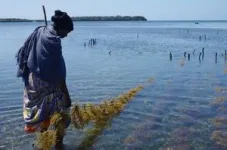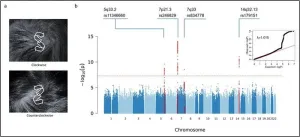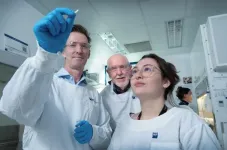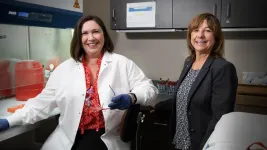The voices of indigenous peoples and local communities as an important part of the climate fight
Coinciding with the International Day of Indigenous Peoples, an ICTA-UAB study calls for indigenous peoples' in-depth knowledge of climate change to be considered.
2023-08-09
(Press-News.org) Coinciding with the International Day of Indigenous Peoples, an ICTA-UAB study calls for indigenous peoples' in-depth knowledge of climate change to be considered.
Indigenous Peoples and local communities around the world have a rich and extensive general knowledge of climate change impacts and possible ways to adapt. This knowledge should be recognised by both science and climate policy.
This is the main conclusion of an international study led by the Institute of Environmental Science and Technology of the Universitat Autònoma de Barcelona (ICTA-UAB) which has spent five years analysing and providing detailed data on how Indigenous Peoples and local communities perceive and respond to the impacts of climate change in their territories.
Led by Victoria Reyes-García, ICREA researcher at ICTA-UAB, the Local Indicators of Climate Change Impacts (LICCI) project, funded by the European Research Council (ERC), has analysed 52 case studies in indigenous and local communities around the world. The project has benefited from the invaluable collaboration of a network of researchers.
The findings show that Indigenous Peoples and local communities are disproportionately affected by climate change, as they often live in climate hotspots and depend on nature-based livelihoods. Societies often marginalised due to historical and ongoing inequalities, climate change is only one among several challenges they face within a wider context of environmental degradation.
The results show that these communities have a rich and nuanced knowledge of climate change impact adaptation methods. "Connected with their natural environment across generations, they have a holistic understanding of the cascading effects of climate change impacts, from changes in atmospheric, physical and biological systems to impacts on their livelihoods," explains Victoria Reyes-García.
The case studies cover a range of topics, such as how weather instability makes farming increasingly difficult in Peru or Mexico and sea-ice hunting extremely risky in the Arctic regions, or how changing tides and temperatures on shallow reefs make it difficult to catch octopi in Wasini Island in Kenya. The research covers communities ranging from Koryak reindeer herders in Siberia, Russia, to those in northern Kenya or Puna Seca in Argentina, fishermen on the Juruá River in Brazil, Inuit in Nunavut, Canada, Quechua farmers in Peru, Mapuche-Pehuenche in southern Chile, and indigenous people in Fiji.
Results stress that the adaptive responses of indigenous peoples and local communities to the impacts of climate change are varied and can inspire effective adaptation pathways for other vulnerable communities. Yet, despite their valuable expertise, their knowledge is not taken into account enough in climate change reporting and policies, even in regions where data is scarce due to their difficult access or when the adaptation measures are applied in their territories.
Therefore, researchers claim that "as legitimate custodians of knowledge regarding climate change and its impacts on the local environment, Indigenous Peoples and local communities should have a more central role in the scientific and political processes of understanding and adapting to climate change” and call for institutions involved in assessing impacts and designing adaptation policies and plans at local, national, and international levels to incorporate them into decision-making.
They also call for special attention to be paid to the rights of Indigenous Peoples, including respect for their sovereignty as well as to the rights of other nature-dependent communities, ensuring that they genuinely participate in assessment, decision-making and redress mechanisms.
END
ELSE PRESS RELEASES FROM THIS DATE:
2023-08-09
Philadelphia, August 9, 2023 – The first gene mapping study on human scalp hair whorls not only shows that hair whorl direction has a genetic basis, but also that it is affected by multiple genes. Four associated genetic variants that are likely to influence hair whorl direction are identified, as reported in the Journal of Investigative Dermatology, published by Elsevier.
A hair whorl is a patch of hair growing in a circular pattern around a point specified by hair follicle orientations. As an easily observed human trait, scalp hair whorl pattern is typically defined by the whorl number (single ...
2023-08-09
CLEVELAND, Ohio (August 9, 2023)—Despite the fact that nearly 90 million women in the United States are projected to be postmenopausal by 2060, menopause remains low on the priority list of many residency programs. A new survey reveals the lack of a standardized menopause curriculum and limited access to menopause educational resources for residents. Results of the survey are published online today in Menopause, the journal of The Menopause Society.
Because women today are living longer, it is not surprising that there are a record number of postmenopausal women. And, that number is only expected ...
2023-08-09
A booster vaccine using implant technology for koalas is being developed by QUT researchers in the fight against the deadly Chlamydia disease.
The new technology is designed to avoid problems for wild koalas and wildlife handlers having to recapture or hold the animals for 30 days, to receive a second immunisation.
Koala chlamydia is a bacterial infection and is one of the leading causes of death for Australian koalas.
QUT researchers have been successfully testing a two-shot vaccine on an isolated wild koala colony ...
2023-08-09
The universe is humming with gravitational radiation — a very low-frequency rumble that rhythmically stretches and compresses spacetime and the matter embedded in it.
That is the conclusion of several groups of researchers from around the world who simultaneously published a slew of journal articles in June describing more than 15 years of observations of millisecond pulsars within our corner of the Milky Way galaxy. At least one group — the North American Nanohertz Observatory for Gravitational Waves (NANOGrav) collaboration — has found compelling ...
2023-08-09
University of Arizona Cancer Center researchers were awarded a $1.5 million grant from the National Cancer Institute to deliver an intensive, multidisciplinary cancer prevention and control research training program for undergraduate and graduate students.
According to multiple principal investigators Jennifer Bea, PhD, and Cynthia Thomson, PhD, RD, the goal of the 10-week, full-time summer program is to motivate students to pursue a career in cancer prevention science.
“I am very concerned about the number of skilled scientists and clinicians retiring,” said Dr. Bea, co-leader of the UArizona Cancer ...
2023-08-09
The number of steps you should walk every day to start seeing benefits to your health is lower than previously thought, according to the largest analysis to investigate this.
The study, published in the European Journal of Preventive Cardiology [1] today (Wednesday), found that walking at least 3967 steps a day started to reduce the risk of dying from any cause, and 2337 steps a day reduced the risk of dying from diseases of the heart and blood vessels (cardiovascular disease).
However, the new analysis of 226,889 people from 17 different studies around the world has shown that the more you walk, the greater the health benefits. ...
2023-08-09
(Santa Barbara, Calif.) — Scientific findings don’t always translate neatly into actions, especially in conservation and resource management. The disconnect can leave academics and practitioners disheartened and a bit frustrated.
“We want conservation science to be informing real-world needs,” said Darcy Bradley, a senior ocean scientist at The Nature Conservancy and a former director of UC Santa Barbara’s Environmental Markets Lab.
“Most managers and practitioners also want to incorporate science into their work,” ...
2023-08-09
A $4 million award from the National Heart, Lung, and Blood Institute, a division of the National Institutes of Health, will allow researchers in the University of Arizona Mel and Enid Zuckerman College of Public Health to identify key factors for the successful implementation of workplace sleep coaching to improve sleep health in Arizona firefighters.
Almost half of career firefighters report short sleep and poor sleep quality, and about 37% of firefighters screen positive for sleep disorders like sleep apnea, insomnia or ...
2023-08-09
Concentrations of potentially harmful chemical compounds in dust collected from air filtration systems on the International Space Station (ISS) exceed those found in floor dust from many American homes, a new study reveals.
In the first study of its kind, scientists analysed a sample of dust from air filters within the ISS and found levels of organic contaminants which were higher than the median values found in US and Western European homes.
Publishing their results today in Environmental Science and Technology Letters, researchers from the University of Birmingham, UK, as ...
2023-08-09
DALLAS, August 8, 2023 — As part of a focused effort to assess current cardiovascular treatment algorithms for racial bias, the American Heart Association, the single largest non-government supporter of heart and brain health research in the U.S., is funding three new scientific research projects at $50,000 each.
Clinical algorithms are formulas, flow charts and computerized “calculators” that work behind the scenes to analyze health data and help determine a person’s risk for heart disease or guide their ...
LAST 30 PRESS RELEASES:
[Press-News.org] The voices of indigenous peoples and local communities as an important part of the climate fight
Coinciding with the International Day of Indigenous Peoples, an ICTA-UAB study calls for indigenous peoples' in-depth knowledge of climate change to be considered.







